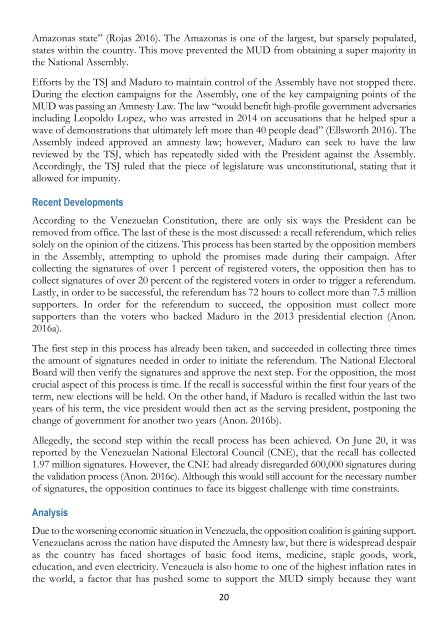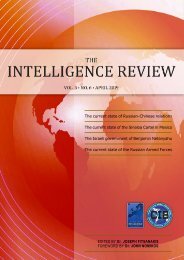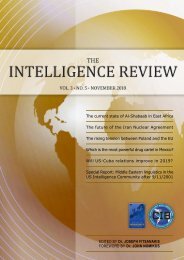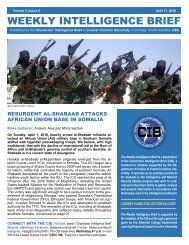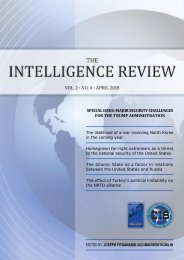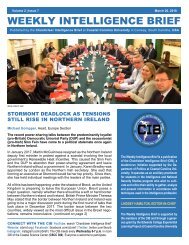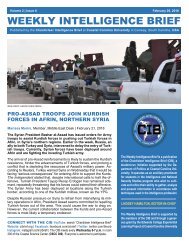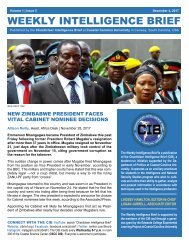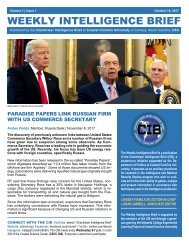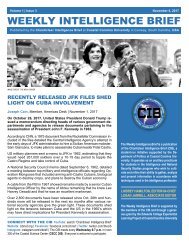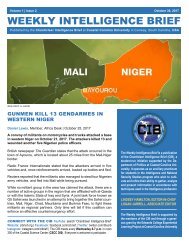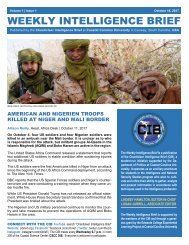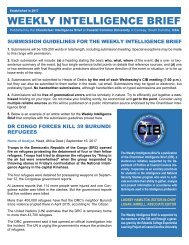The Intelligence Review | volume 1 | issue 1
This volume is the product of a collaboration between the European Intelligence Academy (EIA) and the Chanticleer Intelligence Brief (CIB), a student-run initiative supported by the Department of Politics at Coastal Carolina University in Conway, South Carolina, United States. Eleven CIB analysts tackle some of the most pressing and timely questions confronting intelligence observers today. Topics range from the price of oil to political stability in Venezuela, from the territorial cohesion of Iraq to the future of the Islamic State, and many other pressing subjects that feature daily in news headlines. CIB analysts propose carefully crafted and informed forecasts that outline future developments in some of the world's most unpredictable hot spots.
This volume is the product of a collaboration between the European Intelligence Academy (EIA) and the Chanticleer Intelligence Brief (CIB), a student-run initiative supported by the Department of Politics at Coastal Carolina University in Conway, South Carolina, United States. Eleven CIB analysts tackle some of the most pressing and timely questions confronting intelligence observers today. Topics range from the price of oil to political stability in Venezuela, from the territorial cohesion of Iraq to the future of the Islamic State, and many other pressing subjects that feature daily in news headlines. CIB analysts propose carefully crafted and informed forecasts that outline future developments in some of the world's most unpredictable hot spots.
Create successful ePaper yourself
Turn your PDF publications into a flip-book with our unique Google optimized e-Paper software.
Amazonas state” (Rojas 2016). <strong>The</strong> Amazonas is one of the largest, but sparsely populated,<br />
states within the country. This move prevented the MUD from obtaining a super majority in<br />
the National Assembly.<br />
Efforts by the TSJ and Maduro to maintain control of the Assembly have not stopped there.<br />
During the election campaigns for the Assembly, one of the key campaigning points of the<br />
MUD was passing an Amnesty Law. <strong>The</strong> law “would benefit high-profile government adversaries<br />
including Leopoldo Lopez, who was arrested in 2014 on accusations that he helped spur a<br />
wave of demonstrations that ultimately left more than 40 people dead” (Ellsworth 2016). <strong>The</strong><br />
Assembly indeed approved an amnesty law; however, Maduro can seek to have the law<br />
reviewed by the TSJ, which has repeatedly sided with the President against the Assembly.<br />
Accordingly, the TSJ ruled that the piece of legislature was unconstitutional, stating that it<br />
allowed for impunity.<br />
Recent Developments<br />
According to the Venezuelan Constitution, there are only six ways the President can be<br />
removed from office. <strong>The</strong> last of these is the most discussed: a recall referendum, which relies<br />
solely on the opinion of the citizens. This process has been started by the opposition members<br />
in the Assembly, attempting to uphold the promises made during their campaign. After<br />
collecting the signatures of over 1 percent of registered voters, the opposition then has to<br />
collect signatures of over 20 percent of the registered voters in order to trigger a referendum.<br />
Lastly, in order to be successful, the referendum has 72 hours to collect more than 7.5 million<br />
supporters. In order for the referendum to succeed, the opposition must collect more<br />
supporters than the voters who backed Maduro in the 2013 presidential election (Anon.<br />
2016a).<br />
<strong>The</strong> first step in this process has already been taken, and succeeded in collecting three times<br />
the amount of signatures needed in order to initiate the referendum. <strong>The</strong> National Electoral<br />
Board will then verify the signatures and approve the next step. For the opposition, the most<br />
crucial aspect of this process is time. If the recall is successful within the first four years of the<br />
term, new elections will be held. On the other hand, if Maduro is recalled within the last two<br />
years of his term, the vice president would then act as the serving president, postponing the<br />
change of government for another two years (Anon. 2016b).<br />
Allegedly, the second step within the recall process has been achieved. On June 20, it was<br />
reported by the Venezuelan National Electoral Council (CNE), that the recall has collected<br />
1.97 million signatures. However, the CNE had already disregarded 600,000 signatures during<br />
the validation process (Anon. 2016c). Although this would still account for the necessary number<br />
of signatures, the opposition continues to face its biggest challenge with time constraints.<br />
Analysis<br />
Due to the worsening economic situation in Venezuela, the opposition coalition is gaining support.<br />
Venezuelans across the nation have disputed the Amnesty law, but there is widespread despair<br />
as the country has faced shortages of basic food items, medicine, staple goods, work,<br />
education, and even electricity. Venezuela is also home to one of the highest inflation rates in<br />
the world, a factor that has pushed some to support the MUD simply because they want<br />
20


